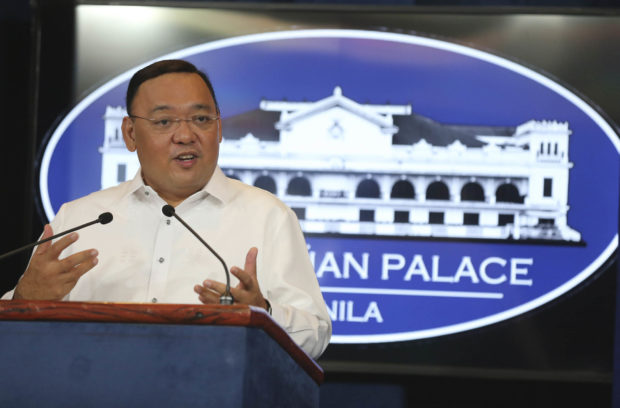
Presidential Spokesperson Harry Roque. INQUIRER file photo / JOAN BONDOC
The proposed federal Constitution crafted by the 22-member Consultative Committee (Con-com) on Charter change is now open to public scrutiny and possible revisions, Malacañang announced on Thursday.
Presidential spokesman Harry Roque said the public can send their feedback in writing, through email, or in person.
It can be submitted to the Office of the Presidential Spokesperson, the Presidential Communications Operations Office, or the Office of the President, Roque said.
Both President Rodrigo Duterte and the Con-com would consider the public’s feedback in improving the draft Charter.
“The President would consider the comments of the people and can improve the draft before submitting it to Congress,” Roque said in a press briefing.
“We will consider the feedback, and if need be, incorporate some of them in the proposal to Congress. Of course, the feedback is also important to Congress,” the spokesman said.
‘Apprehensions’ of Cabinet members
President Duterte was apparently prompted to seek the public’s scrutiny after some of his Cabinet secretaries expressed their “apprehension” with the draft federal Charter’s economic aspects.
To recall, Finance Secretary Carlos Dominguez and Socioeconomic Planning Secretary Ernesto Pernia raised their concerns on the possible implications that federalism may bring on the country’s economy.
“To be candid about it, it started when his own members of the Cabinet expressed apprehensions over the economic aspect of the proposed draft ‘no,” Roque said.
“That’s what prompted the President to be open to suggestions and criticisms on the proposed revisions as submitted by the Consultative (Committee),” he said.
‘Reasoned, intelligent’ procedure
Subjecting the draft federal Constitution to close public scrutiny was also Duterte’s way of getting Filipinos to participate in a “reasoned” and “intelligent” discourse on Charter change.
“The period for discussion is very important that we have open, frank, candid and reasoned discussion on the proposed revisions considering the importance of the Constitution as the fundamental law of the land,” Roque said.
“We want this to be a reasoned and an intelligent procedure,” he added. /je